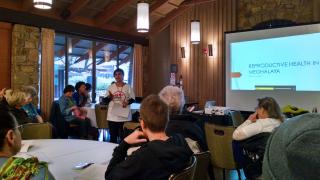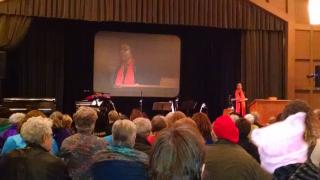Weaving Global Partnerships at the Third International Women's Convocation
By Allison Hess

As the orange sun set over the Pacific Ocean on Thursday, February 16, 2017, women gathered from around the world in Pacific Grove, California to begin a three-day convocation exploring issues important to women’s rights and justice. It was the Third International Convocation of Unitarian*Universalist Women and People of Progressive Faith at the Asilomar Conference Center. Located on the Monterey Peninsula, in what is often called a “refuge by the sea,” we found ourselves in a spiritual refuge far from the troubles afflicting the rest of the world. Most of the participants were from the United States (17% came from outside the US), and the new US presidential administration’s agenda permeated a great deal of conversation throughout the scheduled programming. Although we were physically in a refuge, separated from TV and the comings and goings of the outside world, the problems afflicting our societies were at the front of our minds, and we met with the goal of leaving the convocation with action steps to return to our communities and get active in defense of all people’s safety, health, and human rights.

Dr. Rica Lamar from the Madan Laban Unitarian Church discussed Reproductive Health in Meghalaya, NE India, during the Health and Reproductive Justice stream
Five program streams guided participants along the course of the Third International Women’s Convocation. Participants selected between Economic Opportunity, Education, Health and Reproductive Justice, Leadership Development, and Violence Prevention; each of these five streams met separately to learn about their respective topics, and then gathered in smaller “Global Sisters Groups” to discuss the specific issues and create action plans for how the issues might be addressed. The Global Sisters Groups met four times over the course of the three-day convocation and provided an opportunity to get to know women from around the world on a more intimate basis while also exploring and discussing the topics at hand.
I was part of the Health and Reproductive Justice program stream and had the great pleasure of facilitating one of the Global Sisters Groups in that stream. The overarching theme that participants took away from the Health and Reproductive Justice stream, and indeed from the convocation more broadly, was that it is impossible to separate justice issues into discrete topics. As we discussed reproductive justice, we found ourselves drawing constantly on issues relating directly to violence prevention, to economic opportunity, to leadership development, and to education.

Dr. bell hooks addresses the Third International Women’s Convocation during the Saturday keynote address.
We talk a lot about the intersectionality of justice issues, however Saturday’s keynote speaker bell hooks urged us to name it more specifically. As she said, we are really working to combat the “Imperialist-White-Supremacist-Capitalist-Patriarchy” which has created a worldwide system of dominance and oppression. We must be careful in our activism and advocacy not to challenge one system by reinforcing another. For example, as we fight for women’s liberation (destroying the patriarchy), we must be working in solidarity with women of color fighting for their own liberation (destroying imperialist white supremacist patriarchy), and so on. None of us has a single identity and, as the UU United Nations Office explored in an event on the Intersection of Racism and Homophobia last summer, we can never truly achieve freedom from discrimination until all forms of discrimination are abolished.

Women from around the world gathered at the Third International Women’s Convocation.
Even as women gathered from as far as Transylvania, the Khasi Hills of India, and the Philippines, similar issues were at the top of all our minds: how to provide equal access to affordable, comprehensive, inclusive education and sexual education for our youth, how to ensure women are represented equally in decision-making bodies, how to empower women and mothers to be economically liberated to control their own bodies and lives, and so much more. We came together in a community bound by our liberal, progressive faith and formed bonds of friendship and camaraderie that extend beyond all geopolitical, ethnic, or other social borders.
All through the convocation itself was the understanding of how interconnected we are as a Unitarian Universalist community. Many people there already knew each other from Partner Church relationships within their congregations or from prior large gatherings of UUs. And there are so many more opportunities for connection and for sharing learning and experiences across borders. Many women were inspired by the story of how the Our Whole Lives (OWL) sexuality education curriculum came to be implemented in the UU Church of the Philippines. Others were interested to learn how the struggles in Poland for religious freedom and women’s rights are intertwined, or how Unitarian women in the Khasi Hills of North East India are campaigning to eliminate violence against women and girls. We have so much to learn from each other, and this convocation presented a unique opportunity for conversation, networking, and appreciation for these connections we have.
At the conclusion of the convocation, the leaders of each stream shared the action plans to which their groups had committed. We went forth from the “refuge by the sea” motivated, restored, and empowered to bring the energy and ideas we had gathered over the weekend back to our congregations and communities at home.